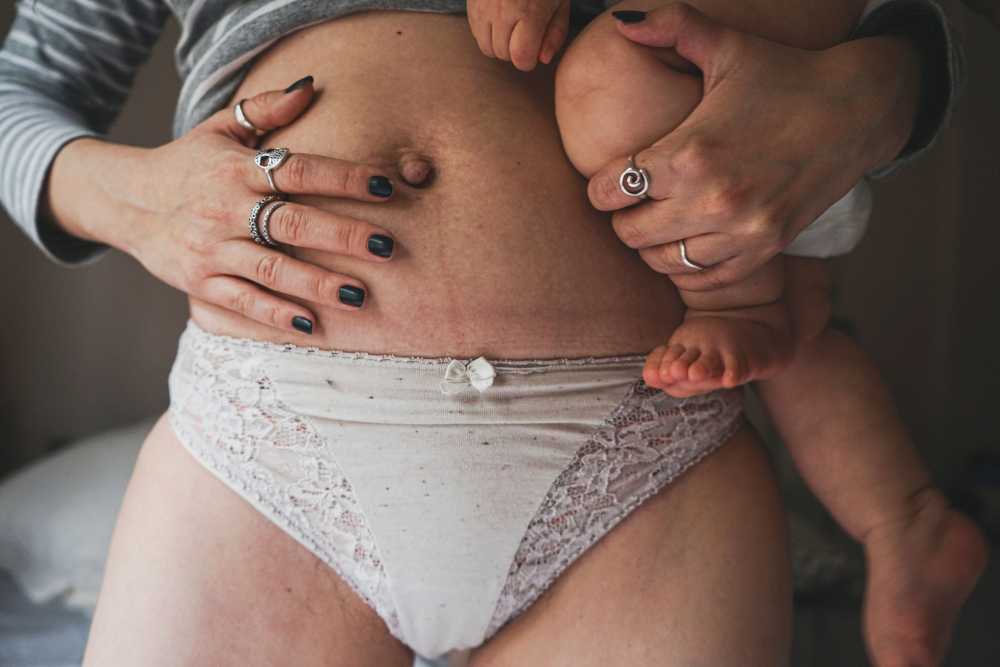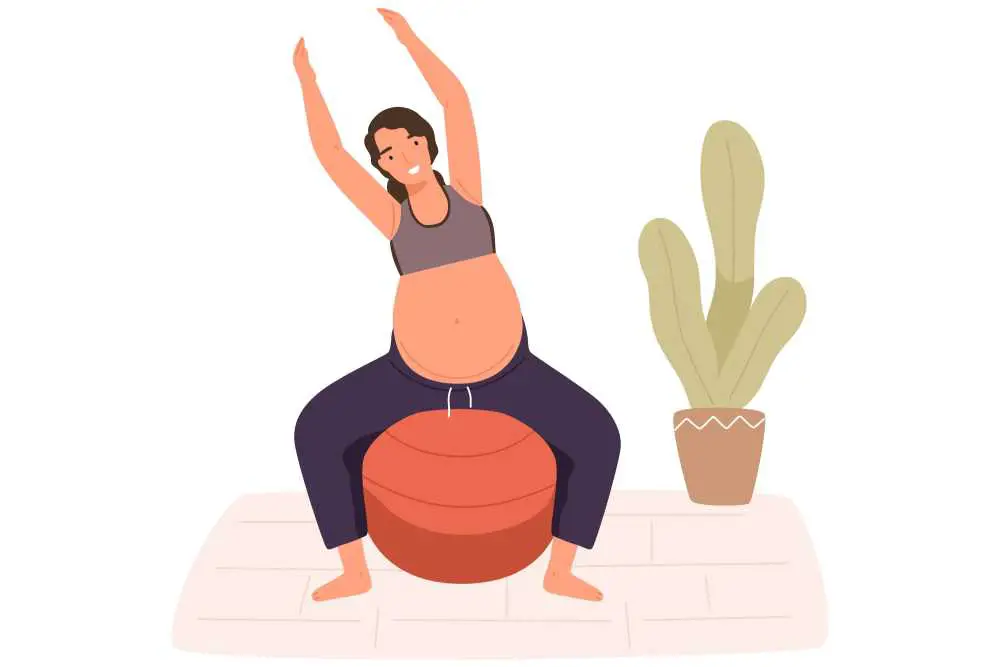The postpartum body undergoes significant changes following childbirth, both internally and externally.
Physically, it’s common for new mothers to experience changes such as weight fluctuations, stretched abdominal muscles, and potentially lingering effects from pregnancy such as stretch marks or loose skin.
Hormonal shifts can also contribute to changes in breast size, skin texture, and hair growth patterns.

Things To Know About Your Postpartum Body
After having a baby, your body will go through many changes. It’s normal! Doctors, midwives, and physical therapists could help you with what to expect during this time.
First off, your body might look different than before you got pregnant. Your tummy might be a bit softer, and you might notice stretch marks or loose skin. Don’t worry, it’s all part of the process.
Overall, your body will need some time to recover from giving birth. Be patient with yourself, and don’t be afraid to ask for help if you need it. You’ve just done something amazing by bringing a new life into the world, and your body deserves some love and care during this time.
1. Postpartum Body Odor
Below are the reasons for postpartum. body odor:
- Body aches can be caused by the physical strain of childbirth, including pushing during labor and delivery.
- Hormonal changes post-birth can also contribute to body aches as the body adjusts to new hormone levels.
- Breastfeeding mothers may experience body aches due to the strain on muscles and joints from holding and feeding their babies.
- Lack of sleep and increased physical activity caring for a newborn can exacerbate postpartum body aches.
- Gentle stretching, warm baths, and over-the-counter pain relievers (if approved by a doctor) can help alleviate postpartum body aches.
- New mothers prioritize self-care, rest when possible, and seek support from partners, family, or healthcare professionals if body aches become overwhelming or persistent.
3. Lochia Stinks
Three Stages of Lochia:
- Lochia rubra: It is the initial discharge, which is typically bright red and contains blood and small clots. It lasts for about 3-5 days after childbirth.
- Lochia serosa: After the initial discharge, lochia becomes lighter in color, usually pink or brownish, as the blood content decreases. This stage can last up to 10 days postpartum.
- Lochia alba: Towards the end of the postpartum period, the discharge becomes yellowish-white or clear. Lochia alba can last for several weeks, gradually tapering off until it stops altogether.
Does Lochia Smell?
Vaginal discharge typically has a mild odor similar to menstrual blood. However, if the odor becomes unusually strong, foul, or unpleasant, it could be a sign of infection.
Infections postpartum can occur in the uterus (endometritis) or in the area where the episiotomy or tear occurred during delivery.
If you notice a strong or foul odor coming from your lochia, it’s important to contact your healthcare provider.
They can evaluate you to determine if there’s an infection present and provide appropriate treatment if necessary.
4. Swollen Feet
6. Saggy Stomach Pooch
The “stomach pooch” or abdominal protrusion that some women experience after childbirth is often due to a combination of factors:
- Diastasis Recti
- Loose Skin
- Weight Gain
- postpartum Hormonal Changes
7. Stretch Marks
Stretch marks, also known as striae gravidarum, are a common occurrence during pregnancy and postpartum.
They typically appear as pink, red, or purple streaks on the skin and gradually fade to a lighter color over time.
While they may not completely disappear, there are ways to minimize their appearance and promote skin health during the postpartum period.
8. Urinary Incontinence
Urinary incontinence, the involuntary leakage of urine, is a common issue during the postpartum period. It can occur due to several factors:
- Weakened Pelvic Floor Muscles
- Hormonal Changes
- Vaginal Delivery
- Vaginal Delivery
- Enlarged Uterus
To manage urinary incontinence during the postpartum period:
- Pelvic Floor Exercises (Kegels): Strengthening the pelvic floor muscles through Kegel exercises can help improve bladder control. These exercises involve contracting and relaxing the muscles that control urine flow.
- Maintain a Healthy Weight: Excess weight can put additional strain on the pelvic floor muscles and exacerbate urinary incontinence. Maintaining a healthy weight through diet and exercise can help alleviate symptoms.
- Stay Hydrated: While it may seem counterintuitive, staying hydrated is essential for bladder health. Avoiding dehydration can help prevent irritation of the bladder lining, which can worsen urinary incontinence.
- Bladder Training: Practice timed voiding, where you schedule regular bathroom breaks, to help train your bladder to hold urine for longer periods between trips to the bathroom.
- Use Absorbent Products: Utilize pads or absorbent underwear to manage leaks and maintain comfort and confidence.
- Seek Professional Help: If urinary incontinence persists or worsens, consult a healthcare provider.
9, Night Sweats
11. Hair Loss
Hair loss during the postpartum period, often referred to as postpartum hair shedding or telogen effluvium, is a common experience for many women.
It occurs due to hormonal fluctuations after childbirth, specifically a decrease in estrogen levels, which can disrupt the hair growth cycle. Here are some remedies in bullet form:
- Be Patient: Postpartum hair loss is usually temporary and tends to resolve on its own within a few months to a year after childbirth.
- Maintain a Healthy Diet: Consume a balanced diet rich in vitamins and minerals, particularly those essential for hair health such as biotin, iron, and vitamin D.
- Gentle Hair Care: Avoid harsh styling techniques, excessive heat styling, and tight hairstyles that can further stress the hair follicles and contribute to breakage.
- Use a Mild Shampoo: Choose a gentle, sulfate-free shampoo and conditioner to cleanse and nourish the scalp without stripping away natural oils.
- Scalp Massage: Massage the scalp regularly to stimulate blood circulation and promote hair growth. You can use natural oils such as coconut oil or almond oil for added nourishment.
- Consider Hair Supplements: Consult with your healthcare provider about taking supplements specifically designed to support hair growth and health, such as biotin or prenatal vitamins.
- Manage Stress: Practice stress-reduction techniques such as meditation, yoga, or deep breathing exercises to minimize stress, which can exacerbate hair loss.
ll these changes are not winsome. No wonder your mind must be having so many eerie thoughts about how and when would you get your body back… for instance,
- “Will I ever be able to lose pregnancy weight?”
- “When will I be able to get my body back?”
Is this how you are feeling right now? Trust me; you are not alone, and it’s pretty normal to feel the way you do!
- “Yes, you will lose pregnancy weight with a healthy nutritional diet, exercise, and correct lifestyle changes.”
- “Don’t rush into wanting your pre-baby body back. It took you nine months to grow this big, and it will take patience to lose that fat again.”
After reading about the many inspiring celebrity moms, women have made unrealistic goals regarding pregnancy, breastfeeding, losing weight, and a restricted diet. They believe in losing fat faster with ungodly exercise schedules & diet changes.
However, experts suggest otherwise. Celebrity moms have many resources and health specialists guiding them through, something most of us don’t! It’s best not to compare your pregnancy journey with other celebrities!
Even if you have the resources and health specialists backing you up, the professionals would still suggest ‘not overdoing yourself’. You will lose weight eventually with time; here’s how you can do that naturally!
Whether you are a newbie mom or are 12 months into postpartum, these tips will help you get rid of that stubborn belly fat without cutting out your diet.
The first month of postpartum is hard for any mother, but dedication and patience to get back your body is key to losing baby weight.
5 Tips to Reform Body after giving birth
Educate yourself and determine what exercise you can do during 5-6 weeks postpartum weight. Also, buy a few supplements that will rapidly help you lose your Post-baby weight.
1. You should buy a belly band/grisly
This is a traditional and ancient method of wrapping the belly during the postpartum period to reform your body quickly.

Your body needs to heal after birth, and a belly band serves the former very well. A belly band can support abdominal muscles, improve posture, and reduce waistline in a few weeks after giving birth. Including belly bands, also have baby tubes, maxi briefs, and other postpartum essentinals to heal yourself faster.
2. Keep Healthy Food on Hands
Losing weight doesn’t mean cutting off your daily intake, and a lactating and breastfeeding mother needs at least 2000-2800 calories to maintain a healthy milk flow and energy. You shouldn’t compromise you & your child’s health to lose fat.
On the brighter side, breastfeeding burns calories as well! You would burn 500-800 calories per day while breastfeeding your child. Couple it with some healthy exercise, and you are good to go!
Get ready to buy the foods that can help you to lose your Post-baby weight postpartum.
Try to prepare some healthy snacks ahead of time and freeze them.
One feels safe and secure when one has got all done and ready on time, and it gives you peace of mind.
3. Safe Exercises
You can start doing exercises that will help to tighten your core and flatten your belly, strengthen your AB muscles. However, please remember only a few exercises are safe during the postpartum period. So choose exercise wisely to reform your body after birth.
Search for kegel exercises that can help to strengthen your pelvic floor and reduce aches and pain, but do not know how to do them correctly. My favorite postpartum exercises are:
- Pelvic tilt
- Morning yoga (avoid too strenuous postures, and focus on the pelvic region.
- Hip rolling
- Revolved triangle pose
- Cat pose
- Cow pose
- Hip bridge
These exercises will vary for every month of postpartum. In the initial months, stick to easier exercises that aren’t hurting you in any sense. Furthermore, don’t try to overdo your workout hours— 10-15 minutes accompanied by breastfeeding are enough, especially if you have had a difficult delivery or C-section. 4

Once the second month of postpartum hits, things will get easier. You can start practicing for longer minutes:
- Plank
- Side-plank
- Swimming
- Brisk walking-running
- Single straight-leg deadlift
Some tremendous natural supplements can help you lose your baby weight more easily and rapidly; vitamin B complex is one.
4. Extra Key-factors To Remember:
- Always wear a postpartum girdle.
- Drink plenty of water, which can help reduce your body weight
- Do affirmations; this will help you reduce stress and help you lose weight faster.
- Perform meditation and rest to overcome postpartum depression and fasten your postpartum recovery
- You can consume food that helps burn fat and increase your milk production if you’re a nursing mother.
- Refresh your diet with healthy elements like protein, healthy carbs, fresh veggies, and healthy fat.
- Try relaxing in a sitz bath.
How to Lose Baby Fat After Giving Birth
Losing weight seems like a difficult task for any new-be-mom. In all honesty, it truly is difficult— most new moms are sleep-deprived and overwhelmed even to think about any exercising. Stating the obvious, your body just isn’t ready in the first weeks of postpartum for any workout whatsoever!
Also, C-section moms find it difficult to get themselves together for something that seems so frivolous at that time. But heck, it is all okay and expected behavior. You can always start your exercise once you are feeling right about it, no hurry!
1. Breastfeeding:-
Breastfeeding is the best way to burn an astounding amount of calories per day, meaning, whatever you have craved and consumed during your pregnancy, flows out, just like that!
Though we require a lot of calories while breastfeeding, one never has to worry because that is what breastfeeding takes(a lot of calories), and that is what we wish to remove(a lot of calories). Ain’t it a win-win situation?
But remember one thing as soon as you stop breastfeeding, your calories will, once again, take a heap. You can gain a lot of weight if you don’t adjust your diet and exercise routine.
2. Keep an eye on calories and fats:-
Strictly say no to empty-calorie foods like chips, burgers, and sodas. I say, eliminate it from your diet completely.
Instead of that, eat a variety of lean protein, whole grains, fresh veggies and fruits, and many low-fat dairy products. And healthy snacks, always green.
Maintain your sugar level by taking only nutritious foods. Also, stock up on low-fat milk and yogurt for snacks.
Some ideas about a healthy diet
Some snacks that can help you on the right track are listed below:-
- Carrots and peppers with low-fat ranch dressing
- egg salad on whole-grain bread
- whole-grain cereal with fatless milk
- whole-grain bread with nut butter
- boiled eggs
- apples with butter
- fruit smoothies.
IF YOU ARE 6-12 months postpartum, Here’s How You Can Reform Body
Now you can start doing resistance-based workouts, which are the best options for tightening the body and helping to burn most of the calories and flatten your belly.
1. You can apply some lotions and scrubs, which can help tighten and smooth the skin around the belly.
2. Take plenty of night’s sleep to decrease your tense and stressed muscles and increase daily energy levels. The better you feel, the faster you will be able to deal with getting back your body after birth. How to sleep when your little devil is up awake to wreak your night? This post will help you maintain a baby sleeping schedule.
3. Don’t deny help! You and your husband are both together in this hustle. So, allow him to be an equal part of the journey. Similarly, don’t deny your family’s help either. It will help you save energy and perform better as a nursing mother.
So try to take constant naps anytime the baby does; let the housework be damned. That’s how you can keep your energy level high and potential cravings – in check.
With any weight loss program, eating multiple times a day increases the metabolism and decreases the feeling of hunger associated with the term dieting.
You can take a few more natural supplements that help to speed up fat burning.
4. Core Exercise
Try to do more advanced CORE EXERCISES to flatten the post-baby belly and reform the body back after the baby. Until then stay healthy and
Take Care.
